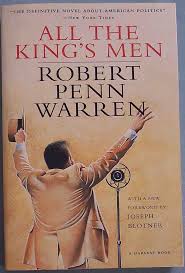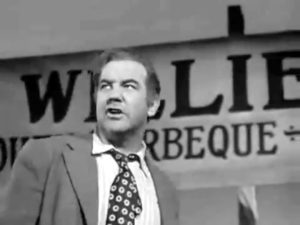 Tis’ the season, class.
Tis’ the season, class.
All the King’s Men opens with an epigraph from the Purgatory section of The Divine Comedy (which I’m finishing soon)—it says “As long as hope maintains a thread of green.” For Dante, it’s in reference to the souls suffering in purgatory who have the chance at redemption, as long as they don’t lose hope. For the characters in All the King’s Men, it’s a sign for readers that we shouldn’t expect things to look remotely hopeful—but maybe we can find a thread of it somewhere in the corruption, pessimism, and political drama that makes up the story.
It’s not my usual kind of book, but it found a way onto my favorites shelf. I read it in high school, at a time when I thought politics was the muck of humanity, and All the King’s Men hit all the right buttons for me. Willie Stark, the focus of the story, is the populist politician running for governor in a Southern state. Jack Burden (with his not-subtle name) is the political journalist following his campaign, and he narrates the story bespecked with details of his life and Willie’s.

Broderick Crawford as Willie Stark in the 1949 movie adaptation of All the King’s Men.
For those of you in the back, with confused looks on your faces, the term populist (as I understand it) is used for the politician who gains steam by catering to the “common man” and antagonizing everyone else. This usually makes me think of a political character from the movie O Brother, Where Art Thou!—one of the most incredible comedies I’ve ever seen, by the way. The movie’s Depression-era politician brings a dwarf to his campaign rallies and shows him off while claiming to fight for the “little fella,” and that’s why you should vote for him (both characters are later revealed to be members of the KKK, and that about sums up my views on populism). Willie Stark is not far away from this picture. He bribes, badgers, and blackmails his way into political power, all the while smiling at the crowd, coming off even as likable.
When Robert Penn Warren wrote All the King’s Men, he based Stark off of real-life Louisiana governor Huey Long, who was controversial enough to be labeled as both a hero of the people and a dictator. While there are enough politicians in history that have earned that level of controversy, anyone paying attention knows that there are more than a few of them in power now—the kinds of politicians who are obviously two-faced, and have somehow convinced the majority of the public that they are good and wholesome. All the King’s Men is one of the novels I know that handle times of political controversy with clarity—the quality most lacking in such times—and that’s why Warren’s novel made an impression on me, and why it should be on the 50-books list.

Author Robert Penn Warren
And for all that, All the King’s Men simply a good book. The story is told out of chronological order, resembling an archaeological dig, burying down into the past and resurfacing to rewrite the present. Jack’s as unreliable as any narrator from a 20th century novel, and his flawed view of the truth makes the story that much more interesting. The rest of the cast of characters (making up the “king’s men” to Willie Stark as king) are meaningfully portrayed and unnervingly relatable, and they happen to tie into the plot well, too. And it’s got enough symbolism to occupy a literature class for a year.
So, by “good book,” I mean that All the King’s Men challenges the reader, questions universal truths, invests in creative characters, satisfies that literature itch I’m always scratching, and is overall a well-written and much-needed story. That’s just about all the criteria I need.
I don’t have a lot of politically-charged novels up my sleeve, and the ones that come to mind aren’t that praiseworthy, so I’ll have to branch out to that realm when I get the chance, if only to become more aware of what’s going on today. Hopefully I wasn’t too subtle when I talked about current two-faced politicians causing controversy—there’s a lot of disgusting behavior coming from world and local leaders these days. The more we understand, the better we’ll respond when those leaders do something despicable.
Just one of those many reasons to read outside your comfort zone. Food for thought.
Prof. Jeffrey
Recent Comments